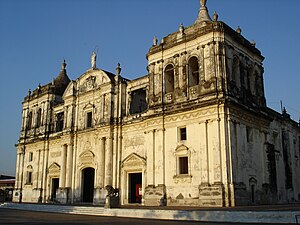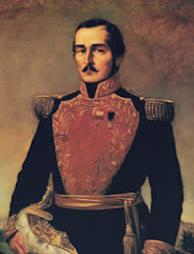Paquador: Difference between revisions
| Line 205: | Line 205: | ||
===Political parties=== | ===Political parties=== | ||
Only two parties are allowed. The governing Nationalist Liberal Party (Spanish: Partido Liberal Nacionalista, PLN) and the opposition Traditional Conservative Party (Spanish: Partido Conservador Tradicionalista, PCT) In effect both parties are the same and are both run by the ruling government to give the impression of democracy. | Only two parties are allowed. The governing [[Nationalist Liberal Party]] (Spanish: ''Partido Liberal Nacionalista'', PLN) and the opposition [[Traditional Conservative Party]] (Spanish: ''Partido Conservador Tradicionalista'', PCT) In effect both parties are the same and are both run by the ruling government to give the impression of democracy. | ||
According to the so called 'Pact of the Generals' (Pacto de los Generales) the ruling party always gains two thirds of the seats in both houses of Congress and the opposition party the final third. | According to the so called 'Pact of the Generals' (''Pacto de los Generales'') the ruling party always gains two thirds of the seats in both houses of Congress and the opposition party the final third. | ||
===Military=== | ===Military=== | ||
Revision as of 19:55, 30 April 2019
Banana Republic of Paquador República Bananera del Paquador (Spanish) | |
|---|---|
|
Flag | |
| Motto: "Patria o la Tumba" "Fatherland or the grave" | |
| Anthem: La Granadera The Song of the Grenadier | |
 Location of Paquador | |
| Capital and largest city | Concepción |
| Official languages | Spanish |
| Religion (2019) | 95% Catholic |
| Demonym(s) | Paquadorian |
| Government | Banana republic |
| Waldo Gustavo Prat | |
| Legislature | Military junta |
| Independence from Spain | |
• Declared | 14 May 1811 |
| Population | |
• 2018 estimate | 4,711,000 |
| GDP (PPP) | 2019 estimate |
• Per capita | $1,307 |
| GDP (nominal) | 2019 estimate |
• Per capita | $2,067 |
| Currency | Peso (PAP) |
| Time zone | UTC-4 (UTC) |
• Summer (DST) | UTC-3 (UTC) |
| Driving side | right |
| Calling code | +595 |
| ISO 3166 code | PQ |
| Internet TLD | .pq |
Paquador, officially the Banana Republic of Paquador (Spanish: República Bananera del Paquador), is a small, landlocked country in South America.
With a population of 4 million people Paquador is the smallest nation in South America in terms of both area and population. It has one of the worlds poorest and smallest economies with 90% of its people liveing below the poverty line. It has a high corruption rating as well as the worst income equality rating in the world. The nation's economy is primarily agricultural. Paquadorian society has extremely stratified social classes, with a large impoverished lower and working class which is primarily agricultural and rural based, and a ruling-class plutocracy, composed of the business, political and military elites of society. Wealth is concentrated in the country's urban centers and in the hands of a few prominent families. Due to this Paquador is the birthplace of the pejorative term "banana republic" .
Following independence from Spain at the beginning of the 19th century, Paquador was ruled by a series of authoritarian governments who generally implemented nationalist, isolationist and protectionist policies. In the early 1900's the country entered a period of military dictatorships, that lasted until 1992. This marked the beginning of the "democratic era" of Paquador. Throughout its history Paquador has consistently endured much social strife and political instability, and remains one of the poorest countries in the Western Hemisphere and is notable for never having a single peaceful handover of power throughout its 200 years of history.
Paquador is famous for having the worlds longest national anthem, the highest number of coups throughout its history as well as having guinea pig as the nations favourite dish. Its national football team is more famous for their horrendous haircuts than their skill at the game and the country has a navy despite being completely landlocked.
History
Pre-Columbian history
Colonisation
Independence and 19th century
Due to its remote location and poor economic output Paquador was never very valuable to its colonial masters and never a target of other nations ambitions. With the independence of neighbouring countries Paquador became de facto independent.
Gaspar Ortiz was the brains of the independence movement. A brilliant military leader and orator and a highly educated individual. He was passionate about developing and progressing the nation. He was a diplomatic master who unified the independence movement.
Francisco Manuel Escobar, a local plantation owner, was a staunch royalist but with the withdraw of Spanish troops from the continent he assembled an army and met with Ortiz before marching on Concepción. The small garrison of Royalist troops promptly surrendered which was accepted by Ortiz however Escobar shot Ortiz in the back and ordered his troops to massacre the surrendering forces in what has become know as the Battle of Concepción.
Escobar proclaimed independence with himself as President. He was extremely corrupt, autocratic, venal, brutal, paranoid, and eccentric, he was widely hated in his day, but the passage of time and revisionist history books have improved his reputation, and today he is widely beloved as an indefatiguable nationalist, anti-imperialist, and patriot.
Escobar ruled the country as he would a large plantation and brutally put down opposition. He would be assassinated in 1830.
20th century
Paquador's authoritarian governments were sympathetic to the Axis powers early in the war; the country's large German community, in particular, were supporters of Nazism, as well as most of the Paraguayan population. Serious thought was given to joining the war on Germany's side, but United States President Franklin D. Roosevelt avoided this by providing aid and military hardware in 1942. Paquador declared war on Germany on February 2, 1945, by which time the war was almost over in order for them to claim to be victorious.
Paquador gained huge amounts of US equipment through Lend-Lease after claiming to be sending thousands of troops to join the fight. In reality no Paquadorian troops ever left Paquador but 1 private was killed in a training accident.
Numerous Nazis fled to Paquador in the aftermath of the war and became involved in Paquador's military and security forces. A huge monument to Paquador's victory in the war was built in Central Concepción.
Geography

Economy
Main industries: timber, fruits, gold
Latin America's poorest economy, Paquador is on the brink of economic collapse. With few natural resources, there is almost no foreign investment. The economy has little to no diversification, focusing solely on single commodities which have varied over the last decades. Almost the entire economy is propped up by the agricultural sector making it extremely vulnerable to natural disasters.
Poverty and corruption levels are crippling. Government debt is likely to have surpassed 120% of GDP and climbing, and inflation is beginning to become unmanageable as a result. Despite considerable gold deposits, there is a lack of investment to extract and what is mined is only exported when the government needs to fund more military expenses.
Paquador depends heavily on foreign assistance to finance development projects and to pay public staff. At the end of 2002, the government owed $4.5 billion to its foreign creditors, with $1.6 billion of this amount owed to other governments and most of the balance owed to multilateral development banks.
Government and Politics

Administrative divisions
Paquador consists of 9 departments (Spanish: departamentos). The nine deparments are:
- Amazonas
- Concepción
- Corrientes
- El Oro
- La Libertad
- Madre de Dios
- Misiones
- Santa Cruz
- Valverde
The departments are further divided into districts (distritos).
Legislative branch
The National Congress (Congreso Nacional) is the legislature of Paquador. The congress is bicameral, the lower house is the 60 seat Chamber of Deputies (Cámara de Diputados) and the higher house is the 30 seat Senate (Senado).
Seats are divided as following, the ruling party gains two thirds and the opposition party gains a third. However, in effect, the congress is a mere rubber stamping institution which masquerades as a democratic institution.
All real legislative power lies with the ruling military junta at the time which usually consists of the head of each branch of the National Guard.
Political parties
Only two parties are allowed. The governing Nationalist Liberal Party (Spanish: Partido Liberal Nacionalista, PLN) and the opposition Traditional Conservative Party (Spanish: Partido Conservador Tradicionalista, PCT) In effect both parties are the same and are both run by the ruling government to give the impression of democracy.
According to the so called 'Pact of the Generals' (Pacto de los Generales) the ruling party always gains two thirds of the seats in both houses of Congress and the opposition party the final third.
Military

The National Guard (Spanish: Guardia Nacional, otherwise known as la Guardia GN) is a militia and a gendarmerie. It acts as both the armed forces and police force of Paquador which gives it huge influence in society. It is notorious for human rights abuses and corruption. It regular interferes in politics.
Intelligence
The Technical Division for the Prevention of Delinquency (Spanish:División Técnica para la Prevención de la Delincuenci DTPD, is the intelligence agency and secret police of Paquador. It is know to use murder, kidnapping, torture, extorsion and terror to achieve its goals.
Members of DTPD are known as "caliés" (Thugs).
Culture
Cuisine

The traditional staples of Paquadorian cuisine are corn, potatoes, quinoa and beans. These ingredients have been combined with a number of staples brought by the Spanish, such as rice and wheat. Meat comes from indigenous animals like alpacas and cuy (guinea pigs), but also from imported livestock like sheep, chicken, cattle and swine. A wide variety of fresh fruit is available, including bananas, tree-grapes, and peach-palms.
Sport
The most popular sport in Paquador, as in most South American countries, is football. Its best known professional teamteams are Nacional and Junior both coming from Concepción. Both are also the most successful football teams in Paquador having won the league between them every year sonce the league was created. The matches of the Paquador national football team are the most-watched sporting events in the country.

The national team play their games at the National Stadium (Estadio Nacional) which, between games is used as a detention facility for political prisoners.
Religion

According to the 2010 census, 97.9% of the population is Roman Catholic which means Paquador is currently one of the most densely Catholic countries in the world.
Roman Catholicism is the state religion of Paquador and it is a requirement that all Presidents be of 'Roman Catholic faith'.






